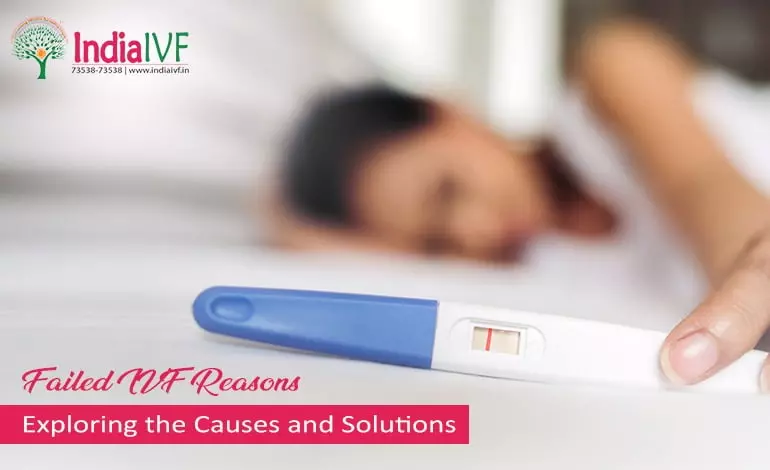Your cart is currently empty!



Embarking on the journey of In Vitro Fertilization (IVF) can be an emotional rollercoaster, filled with hope, anxiety, and uncertainty. At India IVF Clinic in Delhi, we’re dedicated to providing compassionate care and expert guidance to couples struggling with infertility. While many IVF cycles result in successful pregnancies, it’s essential to understand that not every attempt leads to a positive outcome. In this comprehensive guide, we’ll explore the reasons behind failed IVF cycles, discuss common questions, and offer insights into potential solutions.
Why does IVF fail?
One of the most common reasons for failed IVF implantation is the embryo’s inability to attach to the uterine lining. This can be caused by several factors, including:
Poor egg quality can significantly impact the success of an IVF cycle. Factors that can contribute to poor egg quality include:
Read Also: Failed IVF Symptoms: Unraveling the Mystery Behind Unsuccessful In Vitro Fertilization
Yes, IVF can fail, and it’s not uncommon for first-time IVF cycles to be unsuccessful. The overall success rate for IVF varies depending on factors such as age, fertility issues, and the quality of the fertility clinic. However, many couples go on to have successful IVF cycles after experiencing initial failure.
Failed fertilization is another reason behind unsuccessful IVF cycles. This can occur due to:
Even with seemingly perfect embryos, IVF cycles can still fail. This may be due to factors such as:
IVF with donor eggs is a common option for couples facing issues related to poor egg quality or age-related infertility. However, even with donor eggs, IVF cycles can still fail. Some reasons for failed IVF with donor eggs include:
In vitro fertilization (IVF) has become a popular and effective treatment for couples struggling with infertility. However, it’s essential to understand that not every IVF cycle leads to a successful pregnancy. The IVF failure rate varies depending on various factors, such as the patients’ age, the cause of infertility, and the quality of the fertility clinic.
Age plays a significant role in IVF success rates. Generally, younger women experience higher success rates, while the chances of success decrease as maternal age increases. For instance, women under 35 typically have a success rate of around 6800-%, while women over 42 may have a success rate of around 10-30%.
The cause of infertility also impacts the IVF failure rate. Couples with factors such as poor egg or sperm quality, unexplained infertility, or uterine abnormalities may face higher failure rates compared to those with more easily treatable issues.
The quality of the fertility clinic and the expertise of the fertility specialists also contribute to IVF success or failure. It’s crucial to choose a reputable clinic, like India IVF Clinic, to ensure you receive the best possible care and support from IVF specialists throughout the process.
In conclusion, understanding IVF failure rates can help couples set realistic expectations and prepare for the emotional ups and downs associated with the treatment. Working closely with your fertility specialist and making informed decisions can increase your chances of success and guide you towards the best path to parenthood.
The success rate of IVF with donor eggs is generally higher compared to using the patient’s own eggs, especially in cases of advanced maternal age or poor egg quality. However, the failure rate still exists and varies depending on individual circumstances, the quality of the fertility clinic, and the specific factors causing infertility.
Even with seemingly perfect embryos, IVF cycles can fail due to undiagnosed immunological issues, chromosomal abnormalities not detected during pre-implantation genetic screening (PGS), or unknown factors affecting implantation.
IVF failure rates vary depending on factors such as age, fertility issues, and the quality of the fertility clinic. Generally, younger women have higher success rates, while the chances of success decrease as maternal age increases.
There is no definitive number of IVF cycles that guarantee success. However, many couples undergo multiple IVF cycles before achieving a successful pregnancy. Your fertility specialist will discuss your options and create a personalized treatment plan.
The most common reasons for failed IVF implantation include hormonal imbalances, uterine abnormalities, poor embryo quality, and issues with the embryo transfer technique.
Yes, making positive lifestyle changes, such as adopting a balanced diet, engaging in regular exercise, reducing stress, and quitting smoking, can improve your overall health and potentially increase your chances of a successful IVF cycle.
If your IVF cycle fails, it's crucial to communicate with your fertility specialist at India IVF Clinic to discuss your options, evaluate the reasons behind the failure, and consider potential solutions.
At India IVF Clinics we provide the most comprehensive range of services to cover all the requirements at a Fertility clinic including in-house lab, consultations & treatments.